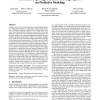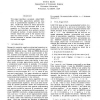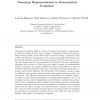432 search results - page 77 / 87 » The Interleaving Problem in Program Understanding |
155
Voted
ASPLOS
2006
ACM
15 years 6 months ago
2006
ACM
Architects use cycle-by-cycle simulation to evaluate design choices and understand tradeoffs and interactions among design parameters. Efficiently exploring exponential-size desig...
103
click to vote
IJCAI
1989
15 years 3 months ago
1989
This paper describes a program, called NEWTON, that finds approximate symbolic solutions to parameterized equations in one variable. N E W T O N derives an initial approximation b...
151
Voted
ASC
2010
15 years 2 months ago
2010
Grammatical evolution (GE) is a form of grammar-based genetic programming. A particular feature of GE is that it adopts a distinction between the genotype and phenotype similar to...
168
Voted
CI
2000
15 years 2 months ago
2000
Kowalski and Sergot's Event Calculus (EC) is a simple temporal formalism that, given a set of event occurrences, derives the maximal validity intervals (MVIs) over which prop...
147
click to vote
CGO
2011
IEEE
14 years 6 months ago
2011
IEEE
—Approximating ideal program outputs is a common technique for solving computationally difficult problems, for adhering to processing or timing constraints, and for performance ...



